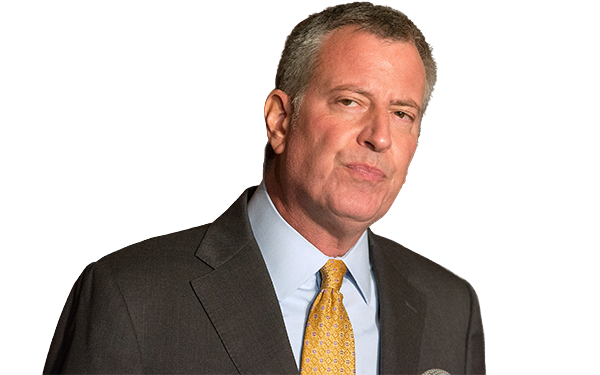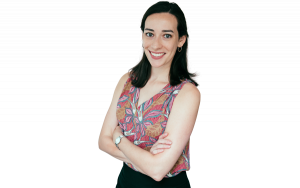Want to Talk NYC Schools with Your Mayor? Better RSVP Early, Talk Faster — and Slow Your Expectations

Queens, New York
It was a Thursday night in New York City and a dozen or so people lining the dark street in Queens were getting impatient with the iPad-toting guards, checking names at the metal gate.
It was a scene you’d expect to see outside, say, a nightclub in Manhattan’s meatpacking district, or wrapping around the hot new speakeasy across the river in Williamsburg. But not this night. No, this Nov. 12 melee was playing out at an elementary school in Jackson Heights, Queens, where Mayor Bill de Blasio was hosting a supposedly public (for those with an RSVP) “Town Hall” on education — only the second such event he’s held since taking office almost two years ago.
Some of the people waiting in line were ultimately turned away from the school, and some could not pierce the gauntlet guarding the front door even though they said they had RSVP’d.
Inside, some 350 people squeezed into wooden seats in the swelteringly hot auditorium, settling in for what would be two hours of rushed questions from parents, teachers, community residents and students.
Their concerns ranged from overcrowded classrooms to teacher quality, the need for mental health services, school safety, testing, the role of librarians, and boosting adult literacy programs.
It had been quite some time since the mayor talked to a crowd of constituents about education, and one could sense an urgency behind some of the questions that parents had been waiting to ask him.
Many stood in line to ask their questions but never got the chance even after de Blasio extended the forum for another half hour. New York City Schools Chancellor Carmen Farina, Deputy Mayor Richard Buery, City Councilman Daniel Dromm, whose district includes the school, and others flanked de Blasio to field the mostly courteous queries.
For those who did get their chance at the microphone, the mayor’s responses tended to be surprisingly short on substance and, in some cases, abrupt.
He barely let a ninth-grade student finish her question about the need for more and better technology in public schools, and how that might help improve test scores, before he interrupted to tout a computer science expansion program he announced in his September speech on education.
“Over the next 10 years, we’re going to be phasing this in,” he said. “Every student in every grade level will have computer science education blended into their entire curriculum, and obviously in the process we’ll be putting a lot more technology in the schools as well.”
Jackson Heights resident Amanda Vender, a teacher and parent of two elementary students, got applause when she urged de Blasio to prioritize arts and physical education over the bevy of tests that eat up her classroom time.
“I know that you’ve spoken about the reduced focus on testing, but I want you to know that I’m really not seeing it in my daily life, at school and my children,” she said. “Since school started I’ve spent 30 percent of my time giving pre-tests and post-tests.”
But again, de Blasio rushed to respond with allocation figures, noting the city has dedicated $20 million toward arts education, though, he said, he knows it’s not enough.
“Honest, blunt truth — we are somewhere on the path to getting both (arts funding and physical education space) done,” the mayor said, ending on a familiar wait-and-see refrain: “We’re not where we want to be yet.”
As for testing, he emphasized the administration's decision to get rid of the school grading system.
“I believe you if you say you’re not feeling the changes regarding testing. I would argue a lot of people are feeling those changes,” he said.
Back outside, those who had gone through the tedious process of RSVP’ing to secure a seat waited and waited, some of them with their children in tow. The auditorium was filled to capacity long before the 7 p.m. start time, they were told. One dad erupted at city officials for not letting him in — even though he’d confirmed his attendance.
The system proved so unpopular that a protester actually turned out to blast not the mayor, nor the event, but the RSVP process, carrying a cardboard sign the derided both de Blasio and Dromm. Local news outlets shared the protester’s sentiments. Earlier in the week the New York Post reported that mayors before de Blasio held no such invite-only Town Halls.
A spokesman for the mayor’s office later said that everyone who arrived before 7:30 p.m. was eventually admitted, whether or not they RSVP’d. The Seventy Four was unable to independently confirm that the father who was turned away was able to eventually enter the school.
Other Queens parents anxious to talk to the mayor never got the chance.
Parents Nina Doster and Crystal Lee-McJunkin said despite RSVP-ing early in the week, they never got the promised callback from Dromm’s office to confirm their spot.
It wasn’t worth it to trek across the borough from South Jamaica to Jackson Heights without being sure they could get in, the women said.
“He needs to hear from real parents whose children are going to failing schools and we weren’t able to get in … so that’s not fair,” Lee-McJunkin said.
Both women are involved with the pro-education reform advocacy group StudentsFirstNY. Doster, who works for the organization as a parent organizer, said she had hoped to ask the mayor how he’ll speed up school turnaround efforts in overcrowded, underperforming Queens schools through his $400 million School Renewal program.
As a guest Friday morning on WNYC’s “The Brian Lehrer Show,” the mayor seemed to recognize the need for more contact with constituents. Even as he brushed off the notion that he hasn’t made himself available to the public, he promised more town halls similar to Thursday’s event.
“We’re going to do a lot more direct-to-the people opportunities like that. I’m going to be out in different neighborhoods,” he told Lehrer.
De Blasio said he thought it was important at the beginning of his administration to focus on “getting the work done.”
“But I’m very comfortable that we have the exact right balance now, with a lot more talking to the people and just cutting out any intermediary,” he said, in an apparent reference to the media.
He didn’t say whether future town halls would require RSVP and early arrival.
Get stories like these delivered straight to your inbox. Sign up for The 74 Newsletter

;)
